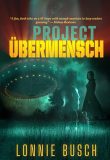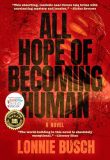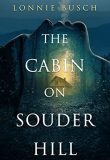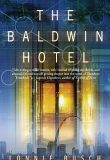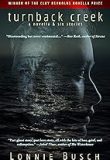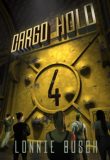Author Interview: Lonnie Busch

The books shown on the left are by Lonnie Busch. Click on the cover to order.
This interview was conducted by Reyan Mishra on May 25, 2024.
Today I am interviewing the talented author Lonnie Busch.
Reyan Mishra: What served as an inspiration for Project Übermensch? Or is it a collection of a variety of ideas you gathered over a long period of time?
Lonnie Busch: The idea of a truly inspirational Christ-like figure with amazing powers (not just some huckster-con-man) in modern times has been stirring in my subconscious for a long while. Probably seeded from my Catholic roots. LOL. Take that and smash it together with some fascinating conspiracy theories—Area 51, The Philadelphia Experiment, the Montauk Project—that have long loitered in my brain, and voila, you have Project Übermensch. I loved the whole idea of this reluctant Messiah figure who truly does care about people, who truly wants to help others, but is curbed by his “handlers.” And for good reason, it would seem, as “they” know more about the potential pitfalls of Geoffrey’s powers than he does.
Reyan Mishra: While reading Project Übermensch, I felt you subtly hint at the repercussions of uncontrolled ambitions. Is that something you see happening in the real world?
Lonnie Busch: Not exactly ambition, but more on point, ambition skewed by unconscious intent. Noted Swiss psychoanalyst Carl Jung’s theories around the collective unconscious—typology, symbols, archetypes and so on—has greatly influenced my writing and my life, as a filter for observing human behavior, as well as my own decision-making process. I think the effects of what he talks about, the idea of “shadow,” can clearly be seen in fanatical religious leaders who preach family values while routinely caught up in sex scandals. The Catholic church, priests espousing God and sanctity while denying their own darkness, only to fall into the pit of pedophilia. But they are only the ones we hear about; this is an issue for every one of us. We don’t realize how many choices we make which are orchestrated by our unconscious content. But how could we? … we’re unconscious! Adolf Guggenbuhl-Craig’s nonfiction book, Power in the Helping Profession, explores Jung’s concept quite disturbingly, demonstrating how our hidden destructive impulses can be directed at others.
Reyan Mishra: When did you start writing, and what kind of stories were you interested in?
Lonnie Busch: As a young boy I was drawn to art. I would sit in front of the b&w TV watching “Learn to Draw with Jon Gnagy.” Painting and drawing were my passion. I never had any desire to write. Never thought about it. And never read, except for school assignments. Between 1989 and 1990, I went through several life-changing events. During that period, on my early morning walks in the dark, I had random pithy sentences pop into my head, which I would write down when I got home, and that eventually grew into poems. At times, the words became so prevalent, I would try to find something to write on, searching the trash along the road for a pencil or pen, a discarded beer carton. (This was a city/suburb setting. Plenty of stuff to choose from!) I thought about taking a pencil and small pad on my walks, but avoided it for a long time, afraid if I prepared, the poetry would stop. But it didn’t. Years ago, a designer friend of mine helped me mock-up a small book of my artwork and poetry from that tumultuous and invigorating time in my life. Someday I will publish it. Maybe.
Reyan Mishra: There is always a story behind the title. How did you come up with Project Übermensch? Any interesting tale?
Lonnie Busch: In 1883, in his book entitled, Thus Spoke Zarathustra, the famous German philosopher Friedrich Nietzsche put forth the idea of the Übermensch. The “over man,” or as it is more often referred to, the “super man.” I liked the sound of it. Someone told me I should change the title, that people might not be able to pronounce it, or be drawn to it. I don’t know. I stayed with it anyway. I thought it fit the story and the feel, though I imagine it could be misconstrued by some. Apparently, over time, it had been misinterpreted and appropriated for agendas that perverted Nietzsche’s intentions.
Reyan Mishra: I see you write in a pretty straightforward manner and that helps make your pieces pretty interesting through and through. What do you credit with shaping your literary style?
Lonnie Busch: Part of it, I think, comes from my crazy love as a kid for Dr. Suess books! But mostly, it developed when I bought my first computer in the late 1990s. I discovered, once I learned how to use the darn thing, that I could write on it using Word. To my surprise, much of my text was underlined in red. Upon further review I saw that many of those glaring underlines indicated Passive Voice. I had no idea what that was, and learned, to my chagrin, it was not a positive quality. My tendency, if left unchecked, was to fall into this passive form of storytelling. From then on, I forced myself into a more child-like approach to writing. Subject, verb, object. “Jack and Jill ran up the hill.” Once I found that comfortable rhythm—subject, verb, object—I was able to construct stronger sentences. Move phrases around for variety in my prose, always with my eye on that simple construction. It probably sounds stupid, but it helped to break that habit. I still write passive sentences; most of them, but not all, are intentional.
Reyan Mishra: Sci-fi thrillers get too complex to follow, however, the way you have constructed Project Übermensch, even a first-timer who’s just testing sci-fi as a genre would find it easy to read and understand. How do you achieve this level of simplicity in writing?
Lonnie Busch: Psycho-Cybernetics! By Maxwell Maltz. It was written in 1969 and somewhere, somehow my dad got his hands on a paperback copy. My dad was (in)famous for his pithy little life lessons, like, “Easy, greasy it’s a long slide ahead.” Which I think meant, take your time, pace yourself. So anyway, one day (evidently quoting Maltz) he says, “Make the strange familiar, and the familiar strange.” When he first said it, I’m sure my eyes were rolling. Supposedly this was Maltz’s approach to creativity, and I have to say, it’s brilliant. I draw upon it all the time when I’m writing. By making wild and weird concepts familiar, you make them “accessible” to a wider audience. And the inverse of the concept is equally brilliant. By making the familiar strange, you make it “new.” Picasso! An entire life of making the familiar strange. One of my favorite artists, as you can probably tell.
Reyan Mishra: The story suggests salvation and damnation are two sides of the same way. What is your take on that?
Lonnie Busch: We live in a duality. We walk a razor’s edge between these two fates. Light and dark, right and wrong, yin and yang. Thesis and antithesis—the idea and its opposite. This goes back to Jung’s ideas on the unconscious, that we all live with this duality inside us, the equal potential for creation and destruction. In my lifetime I have never witnessed a greater example of thesis and antithesis, and what Jung referred to as, “the tension of opposites” as I do in today’s society. We are divided, polarized in our beliefs, walking a very tenuous and frightening line between a potential rebirth and total annihilation. Never since its inception has the Doomsday Clock sat this close to midnight; 90 seconds to global catastrophe. But, as Jung points out, if we can hold this “tension,” and not succumb to rash decisions and faulty logic, we might bring about “synthesis,” the “creative third,” the merging of disparate ideas into a creative new whole.
Reyan Mishra: You certainly have a dab hand at what you do. What advice would you give to aspiring writers?
Lonnie Busch:After a couple of decades of writing, and spending several months on Threads immersed in the posts of a robust writing community, I’ve realized there is no one-size-fits-all approach for authors. Whether it’s marketing, finding one’s audience, sales, editing, promotion, cover artwork, the writing itself, word count, trad or indie, on and on, what works for one writer doesn’t necessarily work for another. The writing community, as well as the reader base, is far too diverse to fall under the umbrella of a single approach to the craft of writing. All I can conclude is there is no right or wrong, only opinions, rumors and supposition, and it’s up to each author to find that unique path that works for them and their writing.
Reyan Mishra: What do you have in mind following the success of Project Übermensch?
Lonnie Busch: Cargo Hold 4! Oh boy, was that a wild and fun ride. Never before has a story gripped me so fiercely. Every day, while I tried to do other things, like get Übermensch ready for publication, finish the cover, edit and proofread and all the tasks involved in self-publishing, I heard, Cargo Hold 4. Cargo Hold 4. What the hell! Cargo Hold 4. Cargo Hold 4. All right, already! Some damn thing is trapped in Cargo Hold 4, and I have to get it out, or at least find out what it is! Maybe a month and half to finish the entire first draft. I’ve never written anything that fast in my life. The word count’s a bit over 60k. I’m planning to release it this coming June, on the 30th. I hope to have it available for presale by the end of May.
Reyan Mishra: We have heard what readers think about Project Übermensch. Great response, really! Now, I wish to know what the writer has to say about his book.
Lonnie Busch: As is true with every book I’ve written, I feel a profound sadness upon finishing. I write the way readers read; one page at a time, discovering the story as I go along. Consequently, when I get to the end, I’ve spent months with characters that I have come to know and love, showing me sides of themselves I hadn’t imagined. Übermensch was such a delight to write. Kirkus gave me a very positive review, and at the end, the reviewer said, “…Geoffrey and Orvin are sure to become favorites.” What that Kirkus reviewer felt is exactly what I felt writing them, watching the relationship between these two men grow, at times moving and poignant, at others, turbulent and contentious, though never without the unspoken bond of love.
Reyan Mishra: Thanks for graciously agreeing to do this interview with me!
Ⓒ 2022 BestSellersWorld.com | All Rights Reserved | Design + Development by The Unglitch

